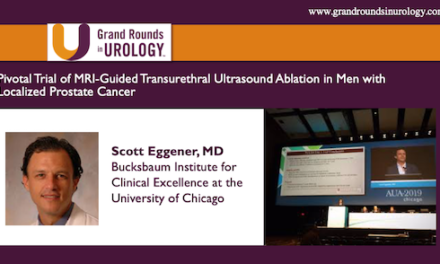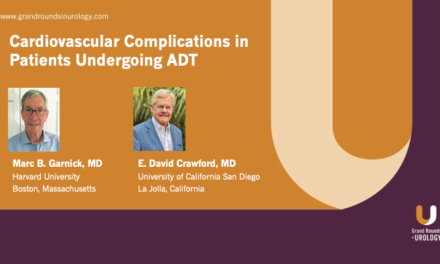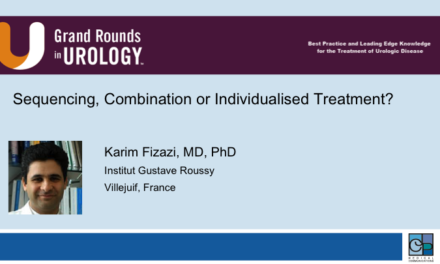Andrei H. Iagaru, MD, FACNM, presented “Non-Invasive Molecular Imaging and its Impact on Management of the Localized Disease and Suspected Recurrence” during the Virtual Global Summit on Precision Diagnosis and Treatment of Prostate Cancer in October 2020.
How to cite: Iagaru, Andrei H. “Non-Invasive Molecular Imaging and its Impact on Management of the Localized Disease and Suspected Recurrence.” October 2020. Accessed Apr 2025. https://grandroundsinurology.com/non-invasive-molecular-imaging-and-its-impact-on-management-of-the-localized-disease-and-suspected-recurrence/
Non-Invasive Molecular Imaging and its Impact on Management of the Localized Disease and Suspected Recurrence – Summary
Andrei H. Iagaru, MD, FACNM, Professor of Radiology and Chief of the Division of Nuclear Medicine and Molecular Imaging at Stanford University, enumerates the applications of a dual radiopharmaceutical-targeted imaging approach using prostate-specific membrane antigen (PSMA) and gastrin-releasing peptide receptor (GRPR) in prostate cancer care. He explains that while PSMA-targeted PET imaging is more widely accepted, GRPR-targeted imaging may identify tumors that PSMA-targeted PET misses and vice versa. Therefore, combining the two can give clinicians a clearer understanding of the patient’s cancer. Dr. Iagaru suggests that the dual target approach can be particularly helpful in guiding biopsy decisions in patients with suspected prostate cancer, as well as in helping identify all lesions prior to local therapy with high-intensity focused ultrasound (HIFU) or brachytherapy. Using two targets can also sometimes allow clinicians to find more lesions prior to prostatectomy and pelvic lymph node dissection. He notes that targeting GRPR with 68Ga-RM2 can be particularly useful in patients with biochemical recurrence, since PSA velocity is higher in 68Ga-RM2 positive scans than in 68Ga-RM2 negative scans. Dr. Iagaru concludes by considering the potential of these two targets in theranostics, noting that phase 3 trials of theranostics with PSMA are awaiting results and that phase 1 and 2 trials of theranostics with GRPR are promising.
The Virtual Global Summit on Precision Diagnosis and Treatment of Prostate Cancer brings together key international opinion leaders of every clinical subspecialty involved in patient care. This event is an integral part of the AdMeTech Foundation’s Annual Summit, which was established in 2016 and become seminal in shaping the state of the art and future vision for precision care. The goal of this event is three-fold: 1) Educating the key stakeholders; 2) Supporting a sustained cross-disciplinary dialogue and consensus on the best emerging clinical practices and research priorities; and 3) Expediting clinical adoption of promising novel diagnostics and therapeutics. For more educational activities from this virtual event, visit our collection page.
ABOUT THE AUTHOR
Dr. Iagaru is a Professor of Radiology and Chief of the Division of Nuclear Medicine and Molecular Imaging at Stanford University Medical Center. He completed medical school at Carol Davila University of Medicine in Bucharest, Romania, and an internship at the Drexel University College of Medicine Graduate Hospital in Philadelphia, Pennsylvania. He began his residency at the University of Southern California (USC) Keck School of Medicine in Los Angeles in the Division of Nuclear Medicine, where he was the chief resident. Dr. Iagaru finished his residency and completed a PET/CT fellowship at Stanford University’s School of Medicine in the Division of Nuclear Medicine. His research interests include PET/MRI and PET/CT for early cancer detection; clinical translation of novel PET radiopharmaceuticals; peptide-based diagnostic imaging and therapy; and targeted radionuclide therapy.
Since joining the faculty at Stanford, Dr. Iagaru has received several awards including the Society of Nuclear Medicine (SNM) 2009 Image of the Year Award; the AuntMinnie 2016 Best Radiology Image; the American College of Nuclear Medicine (ACNM) Mid-Winter Conference 2010 Best Essay Award; the 2009, 2014 and 2015 Western Regional SNM Scientist Award; the 2011 SNM Nuclear Oncology Council Young Investigator Award; and a Stanford Cancer Center 2009 Developmental Cancer Research Award in Translational Science. Dr. Iagaru has presented more than 200 abstracts at national and international meetings and has published more than 140 papers in peer-reviewed journals, as well as seven book chapters and one book.




